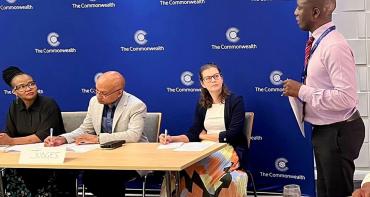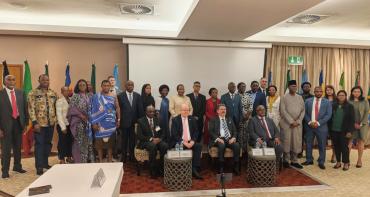An outcome statement by the Commonwealth Forum of National Human Rights Institutions calls on leaders to prioritise human rights in their discussions on climate change, migration and security.

An
The group met in Malta ahead of the Commonwealth Heads of Government Meeting to discuss current human rights challenges in the Commonwealth.
“National human rights institutions have a vital role to play, as independent national authorities on human rights, in promoting public awareness about human rights and protecting citizens’ rights,” said Commonwealth Deputy Secretary-General Josephine Ojiambo at the meeting.
National Human Rights Institutions (NHRIs) are independent public bodies set up to promote and protect human rights in their respective countries. The Commonwealth brings NHRIs together to share experiences and discuss common solutions to human rights issues.
During the meeting, NHRIs presented their activities to end child, early and forced marriage building on the
They pledged to collaborate with other independent bodies, such as ombudsman election commissions and police complaints commissions to strengthen governance structures.
Outgoing Chair of the Commonwealth Forum of National Human Rights Institutions Tan Sri Hasmy Agam said: “The work of a NHRI is never smooth sailing. We are frequently faced with various challenges and obstacles. Therefore, the camaraderie among member institutions is important especially in difficult and challenging times. Support and encouragement from fellow NHRIs can go a long way and has proven to be very meaningful.”
The outcome statement calls on leaders to: “Strengthen human rights protection and promotion in the Commonwealth in compliance with their obligations under international human rights treaties and mechanisms.”
In relation to freedom of expression, NHRIs, “Noted with concern the narrowing of civil society space in the Commonwealth”. They reaffirmed that “freedom of expression, freedom of peaceful assembly and freedom of association are fundamental rights that form the basis of the full enjoyment of all other rights”.
On the issue of migration, they noted that migrants face perilous journeys and discrimination on arrival in destination countries and urged Commonwealth states to ensure their rights are upheld.
The group also adopted
Acknowledging climate change is a global threat to human rights that requires global cooperation, the declaration underscores the link between development, climate change and human rights as core to the very notion of sustainable development. It calls for active and free participation of affected populations, especially the most marginalised, in climate change negotiations and emphasises the need for explicit reference to human rights law and climate justice principles in the new global climate agreement.
NHRIs commit, in the declaration, to develop a work programme on climate justice in order to monitor and evaluate efforts made to tackle climate change. They also pledge to develop tools, such as impact assessment and participatory indicators, to enable progress towards climate justice.
Image

|
Image

|
Image

|
| About the Commonwealth | CHOGM Image Library | Commonwealth summit |



